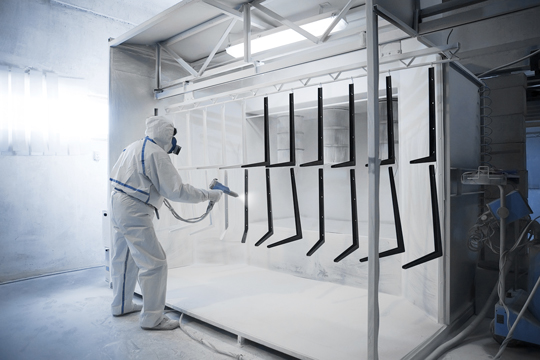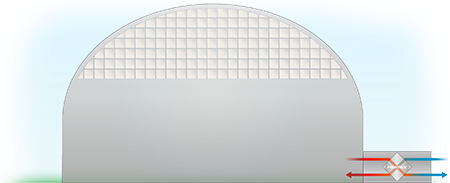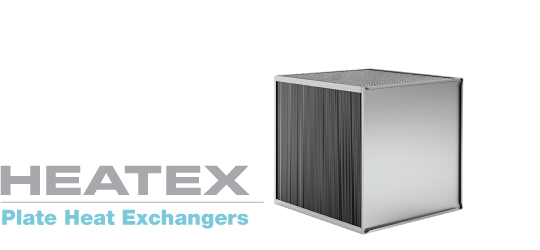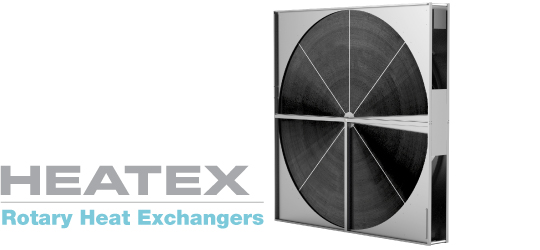Maximizing Energy Efficiency
Industrial facilities consume significant energy, contributing to high operating costs and environmental impact. Maximizing energy efficiency has become a top priority for many industrial ventilation solutions.

Key Benefits of Industrial Ventilation with Heat Recovery
Industrial ventilation solutions with heat recovery involve using specialized systems to extract and recover the heat generated during manufacturing processes. These systems capture the waste heat and transfer it to the incoming fresh air, effectively preheating or precooling the air before it enters the facility. By utilizing this recovered heat, businesses can reduce their reliance on traditional heating and cooling methods, reducing energy consumption and costs.
Moreover, energy efficiency also contributes to environmental sustainability. By reducing energy consumption, industrial facilities can minimize their carbon footprint and mitigate the negative effects of greenhouse gas emissions. This is particularly important in today’s environmentally conscious society, where consumers and stakeholders expect businesses to reduce their environmental impact proactively.
While the upfront investment for industrial ventilation systems with heat recovery may seem significant, the long-term cost savings and return on investment make these systems highly beneficial. Businesses can recoup their initial investment quickly by reducing energy consumption and lowering energy bills.
Additionally, implementing heat recovery systems may make businesses eligible for financial incentives and grants offered by government and utility programs. These incentives can further offset the installation and operating costs, making industrial ventilation systems with heat recovery even more financially advantageous.
Heatex air-to-air heat exchangers are ideal for industrial ventilation solutions, including dehumidification and water removal, process heat or refrigeration recovery, and humidity transfer.
Compared to liquid-to-air heat exchanges, air-to-air heat exchangers are simpler to install and maintain and more economical to purchase and operate.
Heatex provides a wide range of models, sizes, and configurations. We can also produce models that require alternative, customized solutions beyond the standard offering.
Heatex heat exchangers are available in different materials to fit various environments. This also applies to sealing and coating materials.
Use Heatex Select to configure your industrial heat exchanger. It enables accurate calculations of our products’ performance under different conditions. Our application experts will help you calculate your return on investment for any of our products.

Recommended Products for Industrial Ventilation

Heatex Model H2, H & Z
We offer various industrial plate heat exchangers depending on the requirements. Each model is customizable but has distinct advantages.
- Model H2 is our most efficient cross-flow heat exchanger to date.
- Model H has the widest set of options and configurations.
- Model Z is designed to operate in extremely corrosive environments and heavy-duty applications.

Heatex Model E & EQ
We offer various industrial rotary heat exchangers depending on the requirements. Each model is customizable but has distinct advantages.
- Model E offers one of the most compact casings available on the market. This is more efficient than conventional rotary exchangers with the same casing dimensions. The airflows may be oriented side by side or top/bottom, and the complete rotor may be installed vertically and horizontally.
- Model EQ features a segmented wheel that facilitates onsite installation or replacement in narrow spaces, providing lower transportation costs. The shaft’s position can be adjusted in all directions for a perfectly balanced fit in the air handling unit.
Ask an Expert
Our skilled and experienced application engineers support our customers throughout the development process, finding the right solution for your needs.
Contact Us
Corrosion Protection in Industrial Ventilation Applications
Experience has shown that significant corrosion is likely to occur if the relative humidity is above 80% and the temperature is above 0°C. However, corrosion occurs at much lower humidity levels if pollutants and/or hygroscopic salts are present. Corrosivity classes combined with typical applications can be used to define material selection. See the table below.
Heatex offers a broad range of products and materials, depending on each end-user’s needs. The heat transfer plates are made of aluminum as standard, a well-tested and suitable material for industrial heat exchangers. However, we also offer epoxy-coated heat transfer plates for harsher environments, like coastal installations with high salinity or more polluted industrial applications. We recommend multilayered epoxy or stainless steel plates in more demanding applications like heavily air-polluted industries and offshore wind turbines.
Epoxy is also available for rotary heat exchangers.
| Atmosphere | Corrosivity | Application Areas* | |||||
| No/ low pollution | Low – C1 to C2 | Comfort ventilation | |||||
| Moderate pollution and/or low salinity | Medium – C3 | Outdoors, coastal | |||||
| Moderate salinity | High – C4 | Industrial, coastal | |||||
| High salinity & humidity | Very high – C5 | Industrial, coastal | |||||
*For informative purposes only. Only the actual measurements of mass loss will give the correct classification.
High Efficiency Products
High performance for maximizing energy and heat recovery with a fast return on investment.
Technical Expertise
We have the extensive technical knowledge and customized solutions for your unique needs.
Extensive Capabilities
With production facilities in Europe, the US, and China we are always close and accessible.
